- Home
- Michael Crichton
Next Page 13
Next Read online
Page 13
“Possible,” Marty said. “Though unlikely.”
She gave him a frosty look.
“I’ll get right on it,” Marty Roberts said.
Walking back tothe lab, he tried to decide what to do about Raza. The guy was a menace. Marty was certain now that Raza had never ordered the tox screen, which meant that the lab report had been faked. Either Raza had faked it himself, Xeroxing another report and changing the name, or he had an accomplice in the lab who faked it for him. Probably the latter. Dear God, another person involved in all this.
And now Miss Prissypants was on the hunt for wrongdoers because of trace ethacrynic acid. Ethacrynic acid. If John Weller really had been poisoned, Marty had to admit it was a clever choice. The guy was clearly vain about his body. At his age, he had to spend a couple of hours a day in the gym. Probably took a ton of supplements and shit. So it would be hard to prove that he hadn’t taken the diuretic himself.
Hard. But not impossible…Ethacrynic acid was a prescription drug. There would be paper trails. Even if he got it from somebody, another bodybuilder, or a web site in Australia, all that would take days to check out. It wouldn’t be long before somebody decided to take another look at the body and discovered the corpse had no arm and leg bones.
Shit.
Fucking Raza!
Marty started thinking about a forty-six-year-old bodybuilder. Guy that age, grown family—works his ass off to get a body like that, there’s only two reasons. He’s gay or he’s got a girlfriend. Either way he’s not humping his wife. So how does she feel about that? Pissed off?
Probably, yeah. Enough to poison the buff hubby? Couldn’t rule it out. People killed their spouses for less. Marty found himself thinking hard about Mrs. Weller, recalling everything that had happened at the exhumation. He saw it in his mind: the tearful widow, leaning against her tall son, with the dutiful daughter standing beside, holding tissues for Mom. All very touching.
Except…
The minute the casket came out of the ground, Emily Weller got nervous.Suddenly the grieving widow wanted everything done fast. Don’t take the body back to the hospital. Don’t take too many tissue samples. The woman who had demanded a thorough DNA analysis suddenly seemed to change her mind.
Why, he wondered, had she done that?
He could think of only one possible answer: Mrs. Weller wanted her paternity test, but she never imagined the body would be taken back to the hospital for examination. She never thought they would take tissues from multiple organs. She thought they would just grab a blood sample, put the body back in the ground, and go home.
Anything more than that seemed to make Mrs. Weller nervous.
Maybe there was hope, after all.
He went intohis office and closed the door. He needed to call Mrs. Weller. It was a delicate call. There would be a hospital record of the date and time of the call. So, why was he calling her? He frowned.
Oh, yes: Because he had to collect her DNA, and that of her children.
Okay, fine. But why hadn’t he collected the DNA from the family at the grave site? It was just a matter of cheek swabs. It would have taken only a moment.
Answer: Because he thought the DNA had already been collected by Miss Prissypants’s lab.
Marty considered that. Rolled it over in his mind.
He could find nothing wrong with it. He had a perfectly good reason to call.
He picked up the phone and dialed.
“Mrs. Weller,this is Dr. Roberts at Memorial Hospital. Marty Roberts.”
“Yes, Dr. Roberts.” A pause. “Is everything all right?”
“Yes, Mrs. Weller. I just want to schedule you and your children to come in and give us blood and cheek tissue samples. For the DNA test.”
“We already did that. For that woman at the lab.”
“Oh, I see. You mean Dr. Hunter? I’m sorry, I didn’t know.”
There was a pause. Emily said, “Are you, uh, doing the tests on Jack now?”
“Yes. We do some of the tests here, and the lab does some.”
“Have you found anything yet? I mean, are you finding what you expected?”
Marty smiled as he listened. She wasn’t asking about paternity. She was worried about something else they might find. “Well actually, Mrs. Weller…”
“Yes?”
“There does seem to be a slight complication. Nothing important.”
“What kind of a complication?”
“The genetics lab found traces of an unusual chemical in Mr. Weller’s tissues. It’s probably a lab error, contamination.”
“What kind of a chemical?”
“I only mention it because I know you wanted your husband to have his final rest as soon as possible.”
“That’s right. I want him left undisturbed,” she said.
“Of course. I would hate to see his final rest delayed for days, or even weeks,” Marty said, “while questions were asked about this chemical and how it came to be found in his body. Because even if it is a lab error, everything from this point on is required as a matter of law, Mrs. Weller. I shouldn’t even be making this call to you. But I…I guess I feel responsible. As I say, I’d hate to see your husband’s final rest delayed for something like a coroner’s inquest.”
“I understand,” she said.
“Of course I would never advise you to do anything but follow the law, Mrs. Weller. But I sensed that disinterment of your husband was an emotionally exhausting experience for you…”
“Yes…yes…”
“And if you didn’t want the further emotional exhaustion of reinterment—to say nothing of the expense—you might elect a less emotional solution. And less expensive, if you were short of funds…You have the right to order the body cremated.”
“I didn’t realize that,” she said.
“I’m sure you never imagined that taking your husband’s body out of the ground would be so traumatic.”
“No, I didn’t.”
“You might decide not to put yourself through it again.”
“That’s just how I feel,” she said.
Marty thought,I’ll bet you do. “Of course, if you knew there was going to be an investigation, you would not be permitted to cremate the body. Certainly I would never suggest you cremate. But you might decide on cremation yourself, for your own reasons. And if that happened soon—later today, or tomorrow morning—then it would just be one of those things. The body was unfortunately cremated before the inquest was called.”
“I understand.”
“I have to go,” he said.
“I appreciate your taking the time to call me,” she said. “Was there anything else?”
“No, that’s everything,” he said. “Thank you, Mrs. Weller.”
“You’re welcome, Dr. Roberts.”
Click.
Marty Roberts leaned back in his chair. He was very pleased with how that call had gone. Very pleased indeed.
Just one more thing, for the moment, remained to be done.
“Fifth-Floor Lab.This is Jennie.”
“Jennie, this is Dr. Roberts down in Pathology. I need you to check on a lab result for me.”
“Is it stat, Dr. Roberts?”
“No, it’s an old test. Tox screen that was ordered eight days ago. Patient name is Weller.” He read off the serial number.
There was a brief pause. He heard the clicking of keys. “John J. Weller? White male, age forty-six?”
“Yes.”
“We did a full-panel tox screen at three thirty-seven a.m. on Sunday, May eighth. Tox screen and, uh, nine other tests.”
“And you kept the blood sample?”
“Yes, I’m sure we did. We keep all tissues these days.”
“Would you check for me?”
“Dr. Roberts, these days we keep everything. We even keep the heel stick cards whenever a child is born. It’s PKU testing required by law, but we keep the cards anyway. We keep cord blood. We keep placenta tissue. We keep surgical excision
s. We keep everything—”
“I understand, but would you mind checking?”
“I can see it’s registered right here on my screen,” she said. “We have the frozen sample stored in freezer locker B-7. It’ll be taken to the offsite storage at the end of the month.”
“I’m sorry,” Marty said. “But this involves a potential legal issue. Would you physically check to make sure the sample is where it’s supposed to be?”
“Of course. I’ll send somebody down there and call you back.”
“Thank you, Jennie.”
He hung up and leaned back in his chair again. Through the glass wall, he watched Raza scrubbing down a steel table, in preparation for the next autopsy. Raza did a thorough job of cleaning. Marty gave him that: The guy was thorough. He paid attention to details.
Which meant that he was not above changing the hospital database to indicate the storage of a nonexistent sample. Either he did it, or he had someone do it for him.
The phone rang. “Dr. Roberts? It’s Jennie.”
“Yes, Jennie.”
“I’m afraid I spoke too soon. The sample for Weller is thirty cc’s of venous blood, frozen. But it’s not in B-7; it seems to have been misplaced. I have a trace on it now. I will let you know as soon as it’s found. Was there anything else?”
“No,” Marty said. “Thank you very much, Jennie.”
CH020
Finally!
Ellis Levine found his mother on the second floor of the Polo Ralph Lauren store on Madison and Seventy-second, just as she came out of the dressing room. She was wearing white linen pants and a colorful wraparound top. She stepped in front of the mirror, turning this way and that. Then she saw him.
“Hello, dear,” she said. “What do you think?”
“Mom,” he said. “What are you doing here?”
“Buying my cruise wardrobe, dear.”
“But you’re not going on a cruise,” Ellis said.
“Oh yes,” his mother said. “We take a cruise every year. Do you like the cuffs on the trousers?”
“Mom…”
She frowned and fluffed her white hair absently. “And I’m not sure about this top,” she said. “Does it make me look like a fruit salad?”
“We have to talk,” Ellis said.
“Good. Do you have time for lunch?”
“No, Mom. I have to get back to the office.” Ellis was an accountant for an advertising agency. He had left the office and hurried uptown because he had gotten a panic call from his brother.
He walked over to his mother and said quietly, “Mom, you can’t shop now.”
“Don’t be silly, dear.”
“Mom, we had a family meeting…” Ellis and his two brothers had met with his parents the weekend before. A difficult, painful meeting at the house in Scarsdale. His father was sixty-three. His mother fifty-nine. The brothers had gone over the finances with them.
“You can’t be serious,” she said to him now.
“I am.” He squeezed her arm.
“Ellis Jacob Levine,” she said, “you are being inappropriate.”
“Mom, Dad lost his job.”
“I know, but we have plenty—”
“And his pension tanked.”
“It’s only temporary.”
“No, Mom, it isnot temporary.”
“But we have always had plenty of—”
“Not anymore. You don’t. Not anymore.”
She glared at him. “Your father and I talked, after you boys left. He said we would be fine. All that business about selling the house and the Jag. That’s all ridiculous.”
“Dad said that?”
“He certainly did.”
Ellis sighed. “He was trying to keep you from worrying.”
“I’m not worried. And he loves that Jag. Your father always gets a new Jag every year. Ever since you were babies.”
The salespeople were staring at them. Ellis steered his mother off to one side. “Mom, things have changed.”
“Oh,please. ”
Ellis looked away from his mother’s face. He could not meet her eyes. All his life he had looked up to his parents: they were successful, stable, solid. He and his brothers had their ups and downs—his older brother was already divorced, for God’s sake—but his parents were from an earlier generation that was stable. You could count on them.
Even when his father lost his job, nobody worried. True, at his age, there was no chance he would get another. But they had investments, stocks, land in Montana and the Caribbean, an ample pension. There was no reason to worry. His parents did not change their lifestyle. They continued to entertain, travel, spend.
But now he and his brothers were paying the mortgage in Scarsdale. And trying to sell the condo in Charlotte Amalie, and the town house in Vail.
“Mom,” he said, “I’ve got two kids in preschool. Jeff has one in first grade. You know what it costs, private school in the city? Aaron has alimony. We have lives of our own. We can’t keep paying for yours.”
“You arenot paying for me or your father, ” she snapped.
“Yes, we are, Mom. And I am telling you that you cannot buy these clothes. Please. Go back and take them off.”
Suddenly, to his horror, she burst into tears, throwing her hands over her face. “I’mso afraid, ” she said. “What will happen to us?” Her body shook. He put his arm around her.
“It’ll be fine,” he said gently. “Go get dressed. I’ll take you to lunch.”
“But youdon’t have time. ” She was sobbing now. “You said so yourself.”
“It’s okay. We’ll have lunch, Mom. We’ll go to the Carlyle. It’ll be fine.”
She sniffled and wiped her eyes. She headed back to the dressing room, head high.
Ellis flipped open his phone, called his office to say he would be late.
CH021
At theCongressional Biotechnology Prayer Breakfast in Washington, Dr. Robert Bellarmino waited impatiently for his introduction to end. Congressman Henry Waters, famously long-winded, droned on. “Dr. Bellarmino is known to all of us,” he said, “as a physician with a conscience, a man of science and a man of God, a man of principle in an age of expediency, a man of rectitude in a hedonistic era where anything goes, especially on MTV. Dr. Bellarmino is not only a director of the National Institutes of Health, but also a lay pastor of the Thomas Field Baptist Church of Houston and the author ofTurning Points, his book of spiritual awakening to the healing message of Jesus Christ Our Lord. And I know—well, he’s looking at me, and he has to be at the congressional hearing room in one hour, so let me present, our man of God and science, Dr. Robert A. Bellarmino.”
Handsome and assured, Bellarmino stepped to the lectern. His topic, according to the printed schedule, was “God’s Plan for Mankind in Genetic Science.”
“My thanks to Congressman Waters, and to all of you for coming today. Some of you may wonder how a scientist—especially a genetic scientist—can reconcile his work with the word of God. But as Denis Alexander points out, the Bible reminds us that God, the Universal Creator, is separate from His creation but that He also actively sustains it moment to moment. Thus God is the creator of DNA, which underlies the biodiversity of our planet. That may be why some critics of genetic engineering say we shouldn’t do it, because it involves playing God. Some ecological doctrines hold a similar view, that nature is sacred and inviolable. Such beliefs are of coursepagan. ”
Bellarmino paused, letting his audience savor the word. He considered saying more about pagan beliefs, particularly the pantheistic nature worship that some called “California cosmology.” But not today, he thought. Press on.
“The Bible tells us clearly, in Genesis 1:28 and 2:15, that God has given human beings the task, the responsibility to care for the earth and all the creatures on it. We are not playing God. We are answerable to God if we are not responsible stewards of what God has given us in all its majesty and biodiversity. This is our God-given assignment. Weare the st
ewards of the planet.
“Genetic engineering uses the tools the Creator has given us to carry out good works on the planet. Unprotected crops are eaten by pests, or die of frost and drought. Genetic modification can prevent that, use less crop acreage, leave more untouched wilderness, and still feed the hungry. Genetic engineering allows us to distribute the munificence of God to all His creatures as He would want. Genetically modified organisms make pure insulin for diabetics, pure clotting factors for hemophiliacs. Previously these patients often died of contamination. Surely for us to create this purity is God’s work. Who will say it is not?

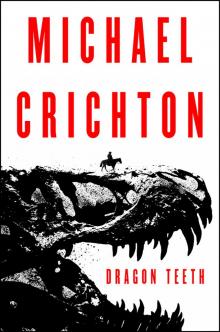 Dragon Teeth
Dragon Teeth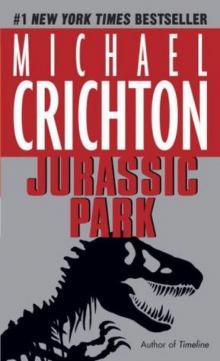 Jurassic Park
Jurassic Park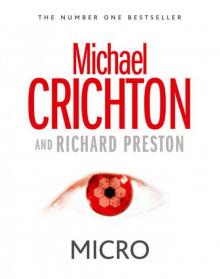 Micro
Micro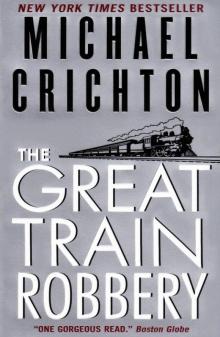 The Great Train Robbery
The Great Train Robbery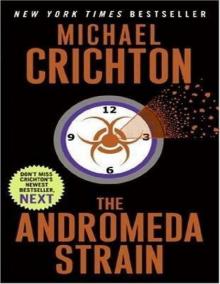 The Andromeda Strain
The Andromeda Strain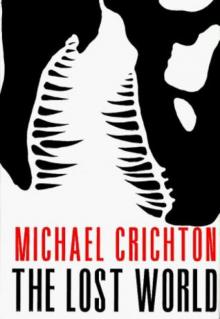 The Lost World
The Lost World Congo
Congo Travels
Travels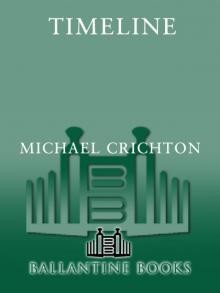 Timeline
Timeline Sphere
Sphere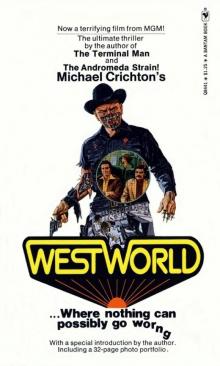 Westworld
Westworld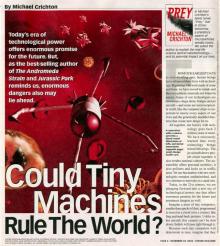 Prey
Prey State Of Fear
State Of Fear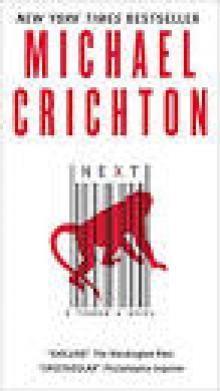 Next
Next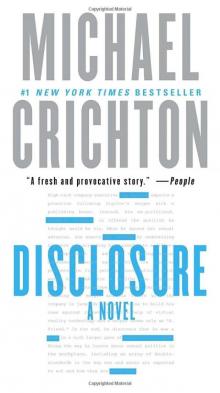 Disclosure
Disclosure Pirate Latitudes
Pirate Latitudes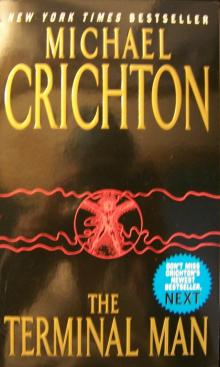 The Terminal Man
The Terminal Man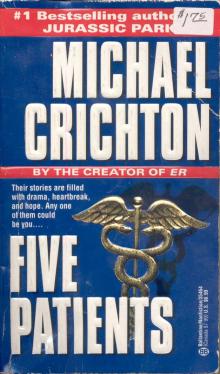 Five Patients
Five Patients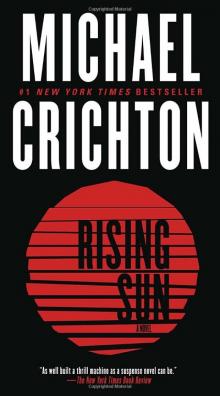 Rising Sun
Rising Sun Binary
Binary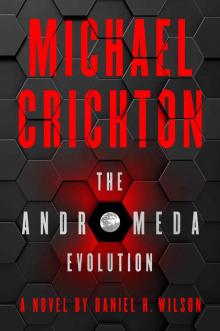 The Andromeda Evolution
The Andromeda Evolution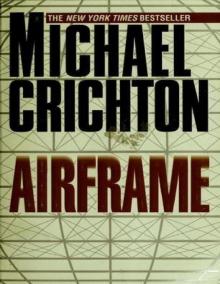 Airframe
Airframe Easy Go
Easy Go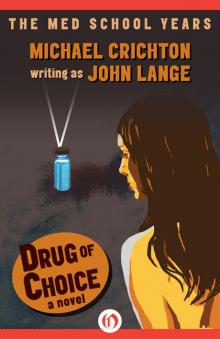 Drug of Choice
Drug of Choice Odds On: A Novel
Odds On: A Novel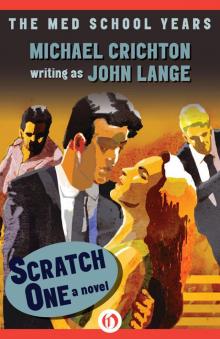 Scratch One
Scratch One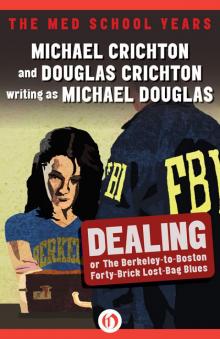 Dealing or The Berkeley-to-Boston Forty-Brick Lost-Bag Blues
Dealing or The Berkeley-to-Boston Forty-Brick Lost-Bag Blues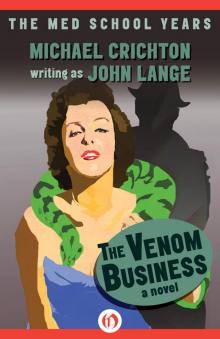 Venom Business
Venom Business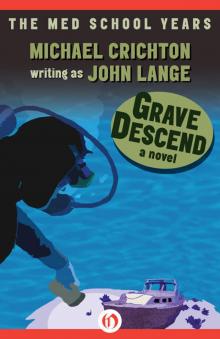 Grave Descend
Grave Descend Gold - Pirate Latitudes
Gold - Pirate Latitudes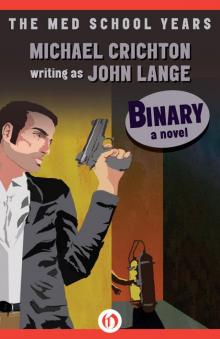 Binary: A Novel
Binary: A Novel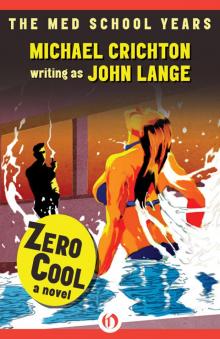 Zero Cool
Zero Cool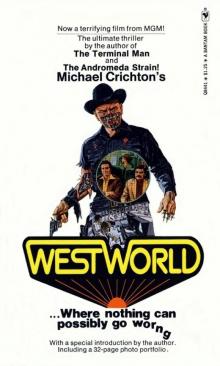 Delos 1 - Westworld
Delos 1 - Westworld